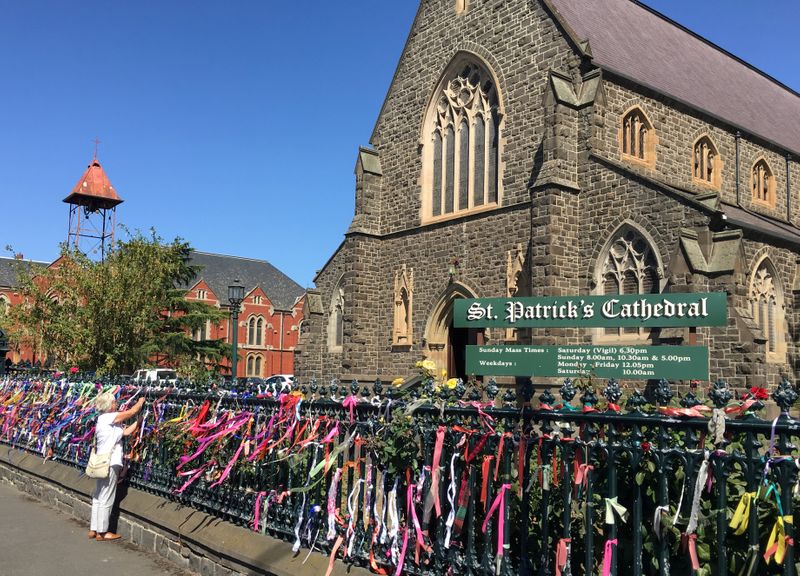By Sonali Paul and Jonathan Barrett
MELBOURNE/SYDNEY (Reuters) - A thick line of black tape obscures Cardinal George Pell's name on a board lauding ordained alumni of St Patrick's College in the Australian town of Ballarat as coloured ribbons flutter on doors and mailboxes.
The high school in Pell's home town has no immediate plans to remove the tape despite the former Vatican treasurer's acquittal this week of the sexual assault of two choirboys in Melbourne in the 1990s.
The High Court's decision to overturn a lower court's ruling and clear 78-year-old Pell, releasing him from jail after serving just over a year of a six-year sentence, has stirred painful memories for child sex abuse survivors in Ballarat.
Belinda Coates, deputy mayor of the town that has the unfortunate distinction of being a hotspot of historic child sex abuse by Catholic clergy in Australia, said the decision was tough for survivors who have long feared the stigma and trauma of going public with allegations.
"There's been shock and disappointment here at the decision," Coates told Reuters in a telephone interview.
Pell not only grew up and went to school in the former gold mining town, located some 120 km (75 miles) west of Melbourne, but served there as parish priest from 1973 to 1983.
Hundreds of people have made claims against the Catholic church in the Ballarat diocese, a region covering the town and 51 surrounding parishes, over alleged incidents from the mid-1960s to mid-1990s. At least six priests and members of the Christian Brothers religious order have been jailed.
Allegations by former pupils at a children's home and three schools, all run by Christian Brothers, comprised an entire case study in a government-backed national inquiry into institutional child sex abuse.
After taking evidence from victims and clergy, the so-called Royal Commission found in a 2017 report there was a "catastrophic failure in the leadership" of the Ballarat Diocese. A climate of secrecy to minimise scandal and protect the Catholic Church saw priests accused of abuse quietly moved to other parishes, while records of allegations were destroyed, the commission said.
Throughout both the Royal Commission hearings and Pell's legal case, coloured ribbons have sporadically adorned buildings in Ballarat as a mark of respect for the abuse victims. New ribbons appeared this week after Pell's conviction was overturned.
"It demonstrates the groundswell of community support for those affected," said Coates, who travelled to Rome in 2016 with abuse survivors to hear Pell's testimony about the Ballarat Diocese to the Royal Commission.
Pell, who was not named as an alleged perpetrator at that inquiry, was called to give evidence about his knowledge of other priests’ conduct, and whether he was present when church leaders decided to move offenders between parishes.
Pell told the inquiry he was not aware of the abuse of children in Ballarat by another priest in the 1970s, but said the Church had made "catastrophic" choices in its response to complaints.
In a statement after the High Court's decision, Pell said he did not want his acquittal to "add to the hurt and bitterness so many feel."
Paul Bird, the current bishop of Ballarat, acknowledged the case had been distressing for both those directly involved and others in the community, including victims of abuse and their families.
"Now that the highest court in the land has given a judgement, I hope this will bring some sense of resolution to all those affected by the proceedings," Bird said.
ISOLATION
Pell, who grew up as the son of a publican before becoming archbishop of both Sydney and Melbourne on his way to the Vatican's inner circle, remains a polarising figure in Ballarat.
Phil Nagle, an abuse survivor who gave evidence to the Royal Commission, said the High Court's decision was particularly tough given it came as the town, like the rest of the country, is in virtual lockdown because of the coronavirus pandemic.
"We'd all go out and have a beer and we can't even do that," Nagle said. "Just because all these things don't stick, doesn't mean everyone loves Pell now."
Pell's former Ballarat high school scratched his name from a building when he was convicted last year, as well as masking his name on the alumni board. St Patrick's this week said it would only consider reinstating Pell's naming honours after all of the findings of the Royal Commission had been released and assessed.
Large parts of the commission's 536-page report into the Ballarat Diocese were redacted ahead of Pell's trial. Australian Attorney General Christian Porter said this week he is inclined to publish the full findings if prosecutors agree that would not prejudice any anticipated legal proceedings.
Catherine King, Ballarat's representative in Australia's parliament, said the ribbons decorating the town would remain a part of the landscape to carry a message of "No More Silence" until the unredacted report is released. Pell declined to comment on Thursday about the report.
Reflecting local anger, King honoured "courageous survivors" after Pell walked free.
"I think that many in the community feel very angry and hurt not just by one individual but the way in which our institutions failed so many children in our community and then compounded the harm by treating them so badly for decades."
